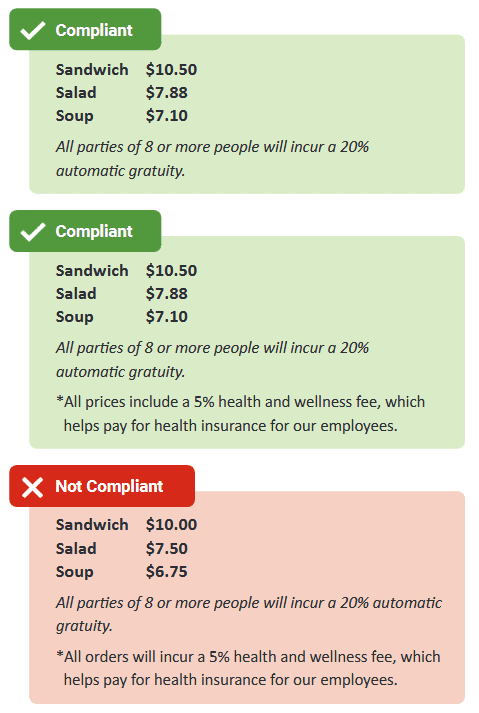Minnesota’s “junk fees” law hitting restaurants excluded from FTC rule
(ABC 6 News) – Minnesota’s new Deceptive Trade Practices Act took effect January 1 with the goal of protecting consumers from so-called “junk fees.” The bill mimics a federal rule implemented by the Federal Trade Commission, but unlike the federal rule doesn’t exclude restaurants.
If you’ve gone to a restaurant in the last few years, you may have seen an extra charge on your bill called something along the lines of a “wellness fee.”
Usually, it’s a flat percentage – somewhere between 2-5%.
However, starting this year, those fees are no more.
“You can’t have any kind of a fee at the bottom of a check anymore,” says restaurant owner Ryan Brevig. “Any kind of fee, a service charge, things like that are now illegal.”
Instead, those kinds of fees now have to be included in the price of an item on the menu. An example from the state Attorney General’s office is seen below:

For many restaurants that don’t implement these fees, the new law changes nothing.
Chester’s Kitchen & Bar in downtown Rochester has experimented with similar fees in the past, but ceased doing so due to customer reactions.
“I think the perception might be, ‘What is this fee really for?,” general manager Derek Jensen said. “‘Are they actually using this money for this particular purpose?'”
For others, like Brevig who co-owns the group that manages Five West and Smoak BBQ in northwest Rochester, the change impacts how they’re able to support their employees.
Their 2% wellness fee helped provide health insurance for their workers at a low cost.
Brevig says public opinion was largely positive.
“Ninety-eight percent I think have been in support of the fee, and the 2% that did not agree with it we just removed it from the bill,” he said. “That’s how we implemented the program from day one.”
Now with the change, Brevig says the restaurants can’t offset the cost and raising prices isn’t a solution they’re considering.
“For our model, we are almost maxed out on a lot of our menu items so it’s not so easy to just throw on a dollar or two dollars on an item because then we’ll be deemed overpriced,” he said.
So, the group is doing away with the wellness fee entirely, still offering employees health insurance, but at a greater cost.
“Since we had to announce to our team, our employees, that the model for providing health insurance is changing as of January 1 because of this law, seven people have canceled coverage,” Brevig said.
It’s not just restaurants either.
The move to increase price transparency will hit other industries as well, such as hotels and ticketed events, which historically have been the biggest culprits of “junk fees.”
Another Minnesota law affecting employees also went into effect January 1, requiring job postings to include a range of how much an employee would be making.